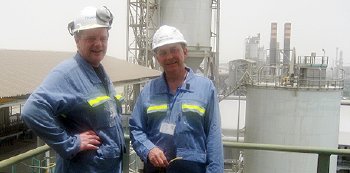Hydro's technology center in Årdal, Norway, is installing a unit to remove sulfur dioxide (SO2) from the flue gas from aluminium production. The unit will reduce annual emissions of SO2 from the technology center by 200 metric tons. It is the first industrial application of this technology.
"We have evaluated SO2 capture in Årdal for some time and have now found a new solution that can be implemented and that will remove at least 95 percent of the sulfur emissions. The installation will also be completed without creating additional emissions or production losses," says Are Dyrøy, who is responsible for environmental technology in the technology unit in Hydro's Primary Metal business area.
 Are Dyrøy (left) and Morten Karlsen, shown here on the job at Hydro's part-owned Qatalum plant in Qatar, are the driving forces behind the project to install new technology to reduce sulfur emissions at Hydro's technology center in Årdal.
Are Dyrøy (left) and Morten Karlsen, shown here on the job at Hydro's part-owned Qatalum plant in Qatar, are the driving forces behind the project to install new technology to reduce sulfur emissions at Hydro's technology center in Årdal.
The treatment plant for the recovery of fluorine, which was built during the expansion of the technology center in 2008, does not remove SO2, as the metal plant in Årdal had dispensation for the increased discharge.
A standard solution for the treatment of SO2 would have increased project costs significantly. So studies were initiated instead into how treatment could be added at a later date.
A solution has now been developed in cooperation with the supplier Alstom that can be installed on a full scale. It is the world's first treatment plant of its kind.
The new treatment facility enables the Årdal metal plant to meet the stricter requirements for emissions of sulfur dioxide that are expected in the future.
Support from Environmental Fund
Sulfur dioxide is a by-product of aluminium production and the consumption of anodes in the electrochemical process. Anodes contain petroleum coke; the coke contains sulfur, which forms the SO2 when the anode is consumed.
"This is an interesting project for two reasons. First, the unit will be installed during full operation at the technology center and second, we have to learn to run aluminium production with anodes containing more sulfur. If the sulfur content rises in the anodes, at least 95 percent of all sulfur dioxide will be removed in the new facility," says Knut Omholt Austreid, director of Technology in Primary Metals.
The new facility has an expected cost of NOK 35 million and is scheduled to be in full operation by the autumn of 2012. To implement this initiative the project has received support from the Process Industry Environment Fund in Norway. The fund was established in 2001 by the Federation of Norwegian Industries and the Ministry of the Environment for the purpose of planning and financing reductions in SO2 emissions from the Norwegian processing industry.
The project which led to the decision to invest in new environmental technologies has been a collaboration between the technology areas in Primary Metal, the Årdal metal plant and Hydro's central Health, Safety and Environment (HSE) department.
"This is an excellent example of interdisciplinary collaboration, where the technology and operating environments in close cooperation with the HSE department have succeeded in finding a good technical solution that can be installed while the plant is in operation. In addition, we have succeeded in getting support from the Environmental Fund for a good environmental project," says Dyrøy.